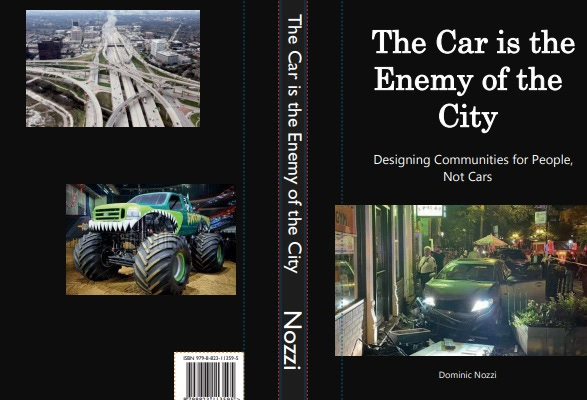New Parking Lot Is Detrimental for Downtown Greenville
The following essay of mine was published in the December 31, 2023 edition of The Greenville News.
Recently a huge surface parking lot was installed for the new United Community Bank headquarters in town center Greenville.
This represents a regrettable, toxic addition to the town center.
The lesson, after a century of not learning it, is that Car is the Enemy of the City.
Which in this case means that infrastructure built in a town center to provide what amounts to affordable (i.e., underpriced) housing for cars is a recipe for destroying the city.
Town centers need what economists call "agglomeration economies." That is, a town center thrives and prospers when it features compact, human-scaled clustering of people, ideas, products, buildings, and services. Surface parking, by destroying human scale and dispersing buildings, people, services, products, and ideas, profoundly undermines the objective of making a town center more healthy.
One of the important reasons why cities such as Greenville have excessive amounts of free parking is that conventional property taxation punishes a property owner for compactly building on property owned by raising taxes when vacant or underdeveloped land is developed. Many town center property owners are therefore encouraged, by the tax code, to speculate on their property by keeping it as a low-value parking lot. The tax code must be revised in the town center so that we tax the land rather than buildings built on the land. Some cities have done this with notable success. It is called a Land Value Tax. https://en.wikipedia.org/wiki/Land_value_tax
For Greenville's town center to become more walkable, more festive, and more attractive – in sum, more desirable -- we must incrementally replace surface parking with buildings.
By the way, it is not just surface parking lots that are a problem. Greenville's town center also has an excessive amount of multi-story parking garages. Garages consume less land (i.e., are more compact) than lots, which makes them somewhat better than lots. But they deaden street blocks. We can improve garages by having them wrapped on the exterior by retail and residences. Or better yet, by having them replaced by active buildings.
In sum, the Greenville town center needs the following parking-related reforms: More properly priced on-street parking (to, in part, reduce the need for off-street parking), prohibiting parking lots as an allowable use in the town center, eliminating the requirement that new development in the town center provides parking, requiring the first floor of parking garages to be active retail or services or housing (I convinced Gainesville FL -- the city I was a planner for -- to enact both the prohibition and the "first floor" rule), adopt a land value tax, and revise city codes and policies to make it far easier and far more attractive for landowners to replace parking lots with buildings.
Let us make a New Year’s resolution to stop being our own worst enemies.





